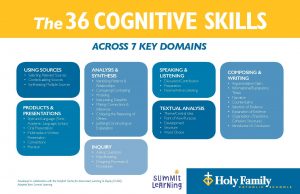An Introduction to Cognitive Skills
What are Cognitive Skills?
Cognitive Skills are interdisciplinary competencies that require higher-order thinking.
David Conley of the Education Policy Improvement Center (EPIC) calls these skills “cognitive strategies” and defines them as “ways of thinking necessary for college work.” The Center for Curriculum Redesign (CCR) suggests that these skills are “how we use what we know” and involve the four Cs: Creativity, Critical Thinking, Communication, and Collaboration (Fadel, Trilling & Bialik, 2015). Educational researcher David Perkins (2014) describes 21st-century skills and dispositions as those that cultivate “critical and creative thinking, collaborative skills and dispositions, leadership, entrepreneurship, and related skills and dispositions that speak strongly to living and thriving in our era.” While the terminology differs across frameworks, there is universal agreement across the research community on the importance of students developing Cognitive Skills.
What is the research behind the development of Cognitive Skills?
Our focus on Cognitive Skills is supported by the most prominent national and international frameworks that have been published over the past ten years describing the competencies required for college and career readiness. Both the Common Core State Standards (CCSS) as well as the Next Generation Science Standards (NGSS) emphasize the teaching and learning of Cognitive Skills. Both sets of standards were developed as a result of extensive research on the skills students need to be successful in college and careers (CCSS, 2010; NGSS, 2013). Well-respected competency frameworks from EPIC, P21, and CCR all prioritize the development of academic skills in addition to the acquisition of content knowledge.
Evidence from cognitive science further supports an emphasis on the development of higher-order thinking skills. A hallmark of deep understanding is transfer, the ability to take an idea learned in one context and apply it to another. Researchers have found that educational experiences that require students to take an active role in their own learning and that emphasize communication and metacognition enable the process of transfer (De Corte, 2003). Our approach to cognitive skill development across grade levels and subject matter rests on the primacy of transfer to promote enduring learning.
It is important to note that the discussion of Cognitive Skills here reflects higher-order thinking skills on one end of a developmental continuum. Recent evidence in learning science suggests that the development of cognitive readiness is a pathway analogous to the development of other complex skills. Cognitive skill development, like other skills, has a “readiness pathway” beneath it that can be built, no matter what a student’s starting point (Osher, Cantor, Berg, Steyer & Rose, In Preparation 2017a, 2017b).
Finally, our emphasis on Cognitive Skills is based on our careful analysis of what skills employers value in future employees. Consider a 2018 national survey of the skills employers most want from college graduates by the National Association of Colleges and Employers. Skills such as teamwork, communication, and collaboration all top the list. Similar lists have been created by the Organisation for Economic Co-operation and Development Education (OECD, 2016) and the Partnership for 21st Century Skills (P21, 2016) based on an analysis of national and international economic and workforce demands.
Click on the image below for an enlarged outline of the 36 Cognitive Skills that are integrated into student learning at Holy Family:
>>>Visit our Personalized Learning page to learn more about personalized learning at Holy Family Catholic Schools.

